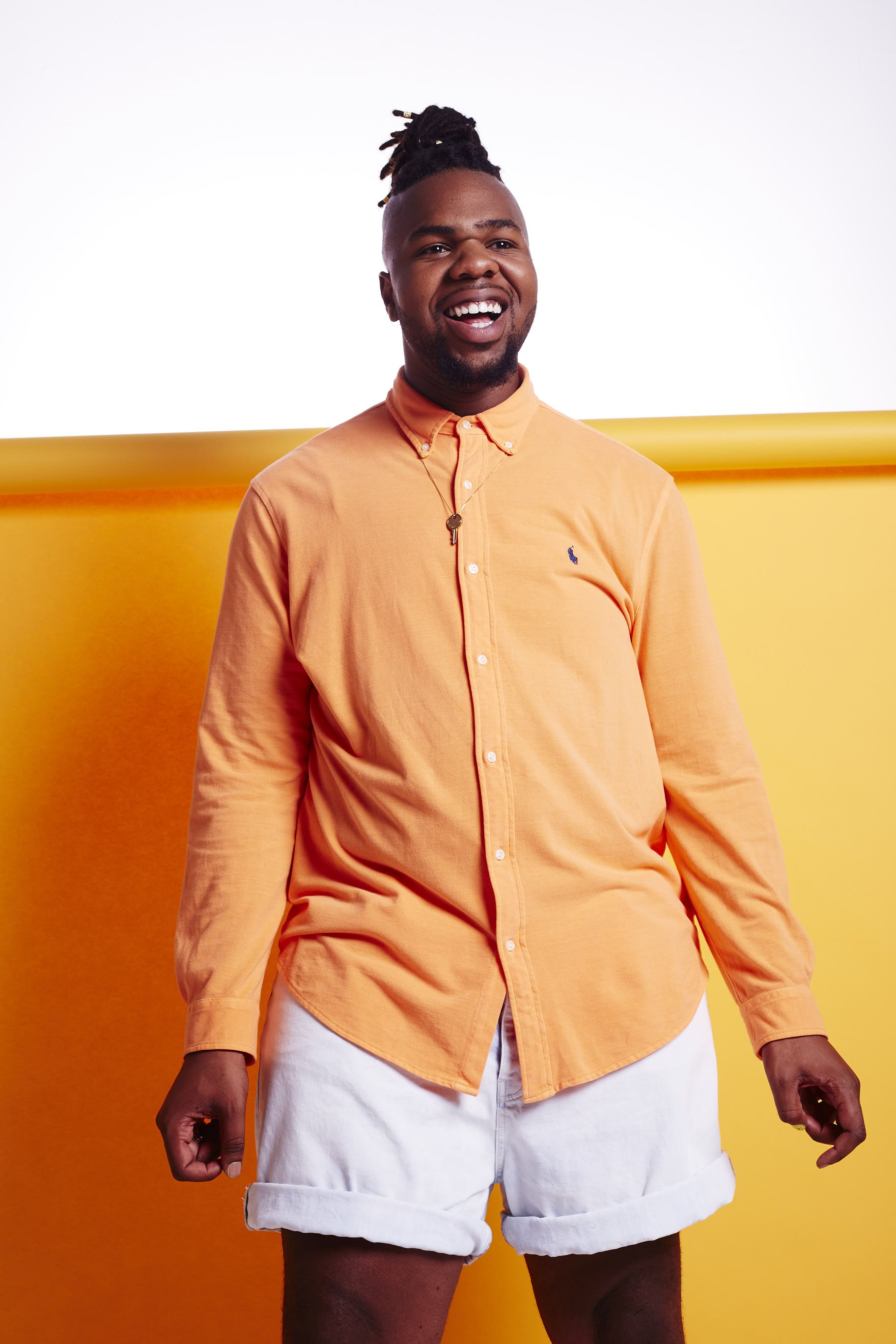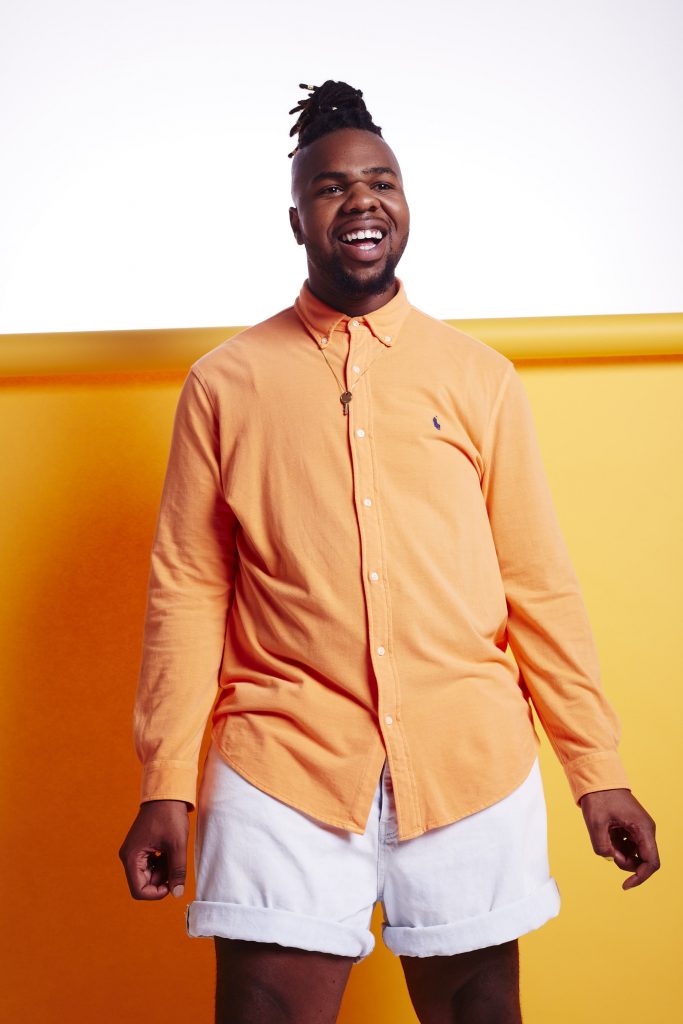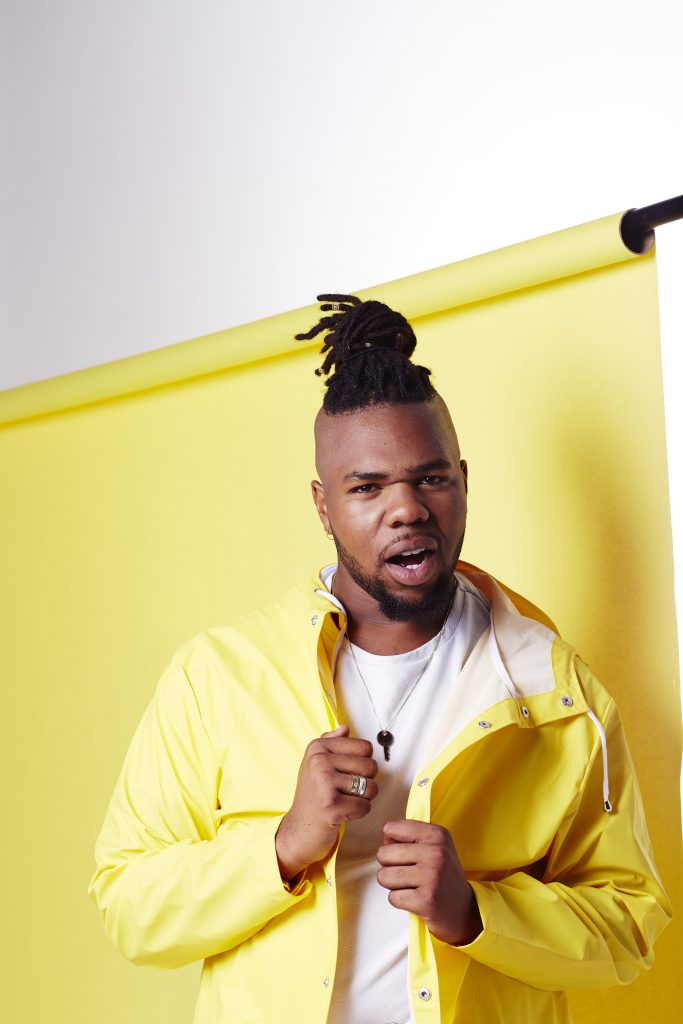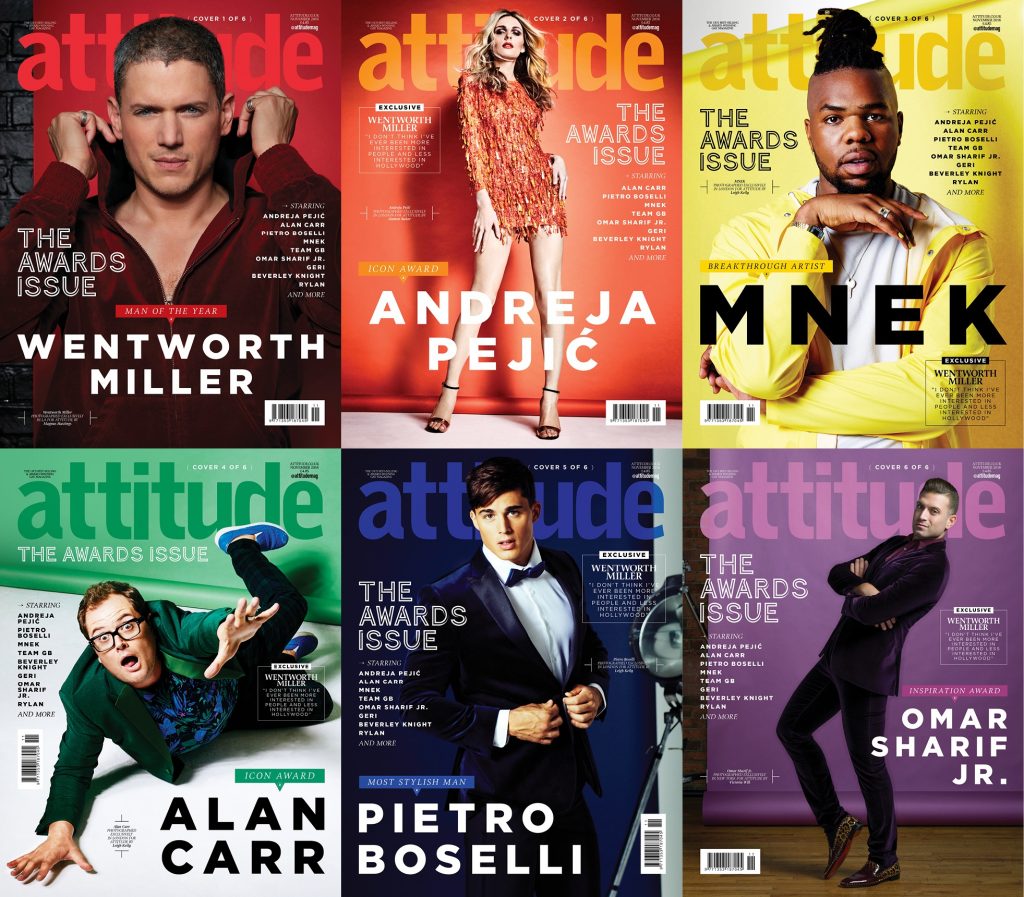Interview | MNEK talks coming out, Madonna, and being a reluctant role model
By Josh Lee

This interview was first published in Attitude issue 276, November 2016.
It’s difficult to find an example of a previous artist who has had the same sort of career trajectory as MNEK. Running straight home from school to work on music, he would jump on MySpace and send his tracks to everyone he could think of. While other kids were kicking about town, MNEK — aka Catford-born Uzoechi Emenike — had one overriding passion: to be in music.
Not just to work within the music industry but to live, breathe, speak, sleep and be music.
Meeting him at our shoot ahead of the Attitude Awards, a musical energy dances out of him; the Wrote A Song About You singer exudes a rhythm that, like his melodies and lyrics, is beguilingly infectious.
He bounces into the studio, beaming a smile that sings out with glee. He’s tall, with an imposing stature, but he’s instantly joyous to speak to. It’s the second time we’ve met, the first was when he and I were judging Miss Sink The Pink, at Bethnal Green Working Men’s Club, in London. (Obvs.)
MNEK is a busy man. Beyond judging drag pageants, the past six years have seen him work with (deep breath): Beyoncé, Madonna, Kylie, Diplo, Zara Larsson, Lianne La Havas, Rudimental, Little Mix, Sub Focus, Bastille… I could go on but you have Google for that.
The point is that his abilities and skill-set, when it comes to music, is genre-busting and broad.
His career kicked-started when NME featured one of his records. It caught the attention of Miranda Cooper, of Xenomania, who, with Brian Higgins, has been behind many of the biggest hits of Cher, Kylie, Pet Shop Boys, Sugababes and Girls Aloud.
She invited a 15-year-old MNEK into the studio and The Saturdays’ All Fired Up was born. It was a quick ride up to the top of the music ladder from there.
“I knew the industry was a mess, I know it can be so fucking brutal,” MNEK says. “I have seen so many people go so abruptly and so heartlessly. Their careers just end.
“I guess I am one of the lucky ones. I was able to figure out what I wanted to do, and evolve with the times and also just make music that I like. I think I was just like: I need to make Plan A work, I have no Plan B. If I am here this early then for fuck’s sake let’s really try to make this work.”
Every moment not in school was spent in the studio. “I would go to school, come back home and work on music, and sometimes after school I would go to the studio in Oxted [in Surrey]. All my half terms would be with Xenomania. I was just there.”
Collaborations with Rudimental (Spoons), Gorgon City (Ready For Your Love), Duke Dumont (Need You 100%) and Zara Larsson (Never Forget You) soon followed.
It wasn’t long before the queens of music came knocking on his door. And not just any queen, but the queen of pop. “I went to the studio with Diplo and we started an idea that was going to be for the Major Lazer project,” MNEK explains. “Then I got a message that Madonna wanted to work with me because of a song idea I had with Diplo and she had finished it — she tweaked the lyrics, she recorded it.”
MNEK got to meet our Madge in the studio, helping to finish the production and work on some backing vocals. “She was really sweet. She was really motherly, and it is really cool that I got to be in a studio with her. She’s someone all of us grew up listening to. She is the Queen of Pop because she is the centre of what pop music, as far as a female pop artist, is. I am really grateful.”

From the Queen of Pop to Queen B, the next diva to enlist the writing talents of MNEK was Beyoncé. When B was working on a song for her album Lemonade, she called on the south London lad’s skills. The track would become the hugely successful Hold Up.
“She wanted to talk about the concept of the album because she knew what she wanted each track to embody. She had all these pieces of paper with — if you have watched the whole Lemonade visual thing — the different words that come up with each song. She had those words on pieces of paper around her.
“So when she was talking about what she wanted to achieve with the album, she was saying all of those key words about redemption and forgiveness and that kind of thing, it was very well thought out.”
With an army of collaborators at her disposal, the song credits a whopping 15 writers, once song samples from the Yeah Yeah Yeahs and Soulja Boy are taken into account. Even so, MNEK’s contribution is the most attention-grabbing portion of the track.
He adds: “I wrote a section of it, the middle eight. We met and she played me the chorus. I sent back essentially a full song and she heard it and she was like: ‘I love this bit, I want this bit as the middle eight’.”
Some people say you should never meet your idols, but MNEK has nothing but praise for Beyoncé. “She is really sweet, she was really conversational. She was also really sharp. She is that kind of person, she is sassy and sweet, but then she can come out with something really quick as well.”
Where Beyoncé’s album tells the story of the fall and rise of a woman who has been scorned after a break-up and has been betrayed and cheated on, MNEK’s forthcoming debut album aims to embody a similarly personal experience. “It’s more the idea about the desire to be understood. There are songs about escapism as well because I think that’s another thing, for me: music is my escape. Not that I have anything to run away from because I like my life. It’s still a safe hiding place.”
Having achieved in half-a-dozen years what many fail to accomplish in a lifetime, it’s easy to forget MNEK won’t even be 22 until November. And as with all young men, he has been on a journey of discovery.
When Attitude first interviewed him in April 2015 he was not fully out. Even if you’re a rising star in pop, growing-up and becoming confident in yourself is still a deeply personal journey that takes its own time.
Despite — Or perhaps because of — his meteoric rise, MNEK only recently came out to his parents. A desire to live an authentic life was at the heart of the decision to tell them about his sexuality. “Beyond my career I was just like, I want to be happy and I don’t want to be with a woman, so what the fuck am I doing?
“I wrote my mum a letter and put it under her pillow. My dad found out because he saw a picture of me and my boyfriend on Facebook. But it’s fine, it’s cool because now he knows.”
The son of Nigerian parents, he experienced the same pressures of acceptance as many other black gay men in the UK. “I think the mentality around black gay men or women is still very much taboo. It’s not even a feeling thing, it is a factual thing. It’s one thing being a black person and experiencing racism, but then it is also another thing being gay and experiencing homophobia.
“Then having those things together as one big thing to be scared of… it means it is always quite tough when it comes to talking to your family about it and being like, ‘OK, so I am gay’. My parents are supportive. Of course, it’s still a work in progress. They’ll say, ‘it’s just a phase, it’s just something he’s going through right now’. You never really know the best way to make them understand, so you just have to live your life anyway.”

MNEK has two brothers, but his relationship with them isn’t perfect. He tells me the eldest, aged 23, has gone “M.I.A.” while the youngest is autistic and struggles to communicate. “It’s kind of weird. That’s where I am with my brothers, as in there’s not really much communication between all of us which is sad, but you move forward, accept the situation for what it is and you create your own family.”
Away from his family, coming out at school was not an option. “That is the last place to do it. It goes back to the black gay thing, when you think of ‘gay’ and you’re around black people it’s usually straight to homophobia a lot of the time, which made me fear ever coming out because it was like I would literally be the one guy, and it’s the desire to fit in and all that stuff. At the point you are out of school, out of 30 kids in the classroom, you just think there is no one I am trying to impress now, I should just be happy.”
Does he think his success helped his parents accept his sexuality? “I would say so. If I was homeless and on the streets of Hackney, my parents would be like, ‘your life is a mess’. Thankfully, I am cool, I have made money since I was 14 or 15 and I have been able to make a life for myself these past seven years. I think that has developed a respect between me and them in that we can have an adult conversation in a way that I couldn’t have if I was still living off them.”
His coming out follows that of two other high-profile gay men in the entertainment industry. He credits the likes of Frank Ocean and Jussie Smollett for helping to change the conversation around being black and gay — here were two proud young figures of representation in music and acting, which didn’t exist in his youth.
“I am a musician who has done very well for himself in making his own music. I get to be the pop star that kids never saw on TV. When you’re a kid, you always look at TV and you watch and wait for the next video to come on and you hope to see someone you can relate to or who represents you and I never quite had that.”
While he finds the role-model tag something of a burden, he’s happy to carry it if it helps inspire young gay men. “I want to be what I didn’t see on TV. Not to say that it means you have to have this pristine image. I’m a mess and I enjoy being a mess, and I enjoy being publicly a mess, too, so I don’t want to have to be this role model but rather, if you see yourself in me then that’s really great because I never saw myself in anyone.”
Never has the Attitude Award for Breakthrough Artist of the Year gone to a more deserving person.
Words: Cliff Joannou
Photos: Leigh Kelly
Attitude’s Awards issue is still available to download here. Meanwhile, our January issue is available to download and in shops now. Available internationally from newsstand.co.uk/attitude.

